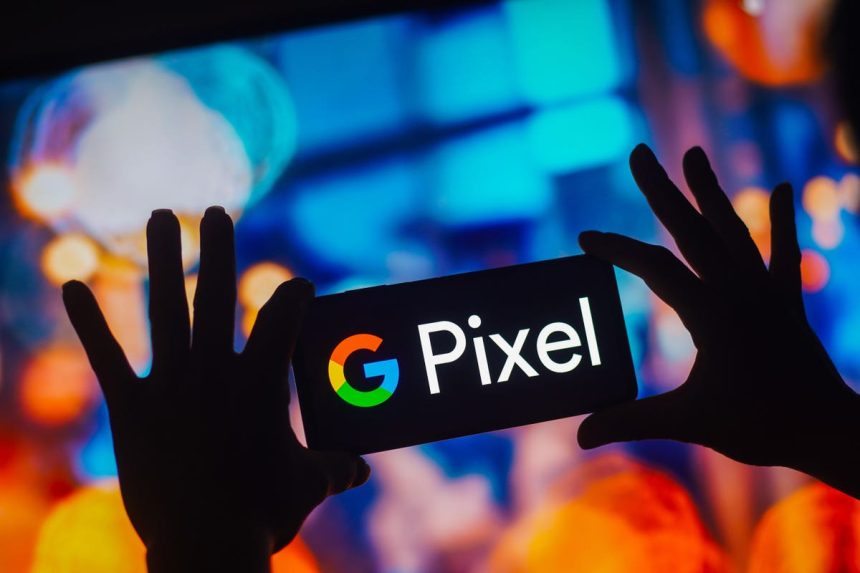Key Takeaways
- Google launched the new Pixel 8 Pro at its latest event for $999
- The share price rose over 2% at the news
- The launch was a welcome distraction from Google’s giant antitrust probe from the government
Another day, another big fancy tech launch. This time, it was Google’s turn, who wanted to emulate the hype around Apple’s iPhone launches with their own snazzy announcements. They were worth the wait: Google has significantly improved the Pixel 8 Pro phone and Pixel Watch 2’s hardware features and provides an artificial intelligence boost to the tech.
The launch was a welcome distraction for Google from its ongoing antitrust trial, with rival Microsoft CEO Satya Nadella testifying this week. As for the investor reaction, Wall Street liked the launch enough to see Alphabet’s share price rise.
Here’s the latest on the Google Pixel launch event, what else Google is up to right now and how the markets have perceived the shiny new products.
What happened at the Google Pixel launch event?
The latest Google product launch was packed full of announcements. The Big Tech titan launched its Pixel 8 Pro phone, which comes with a raft of new features, including a Tensor G3 chipset, an updated 48MP ultrawide camera and a temperature sensor to accurately measure the temperature of surfaces.
The slightly smaller Pixel 8 phone also gets a performance boost thanks to the G3 Tensor processor and a slightly smaller 6.2-inch display. The new Pixel 8 will also get the 50MP main camera, with a slightly smaller 12MP ultrawide lens. Both phones will have powerful AI editing features in Google Photos, including Magic Editor and Best Take.
The Pixel 8 Pro will retail for $999, which is $100 more than its predecessor, the Pixel 7 Pro, and the Pixel 8 also gets a $100 price lift to bring its starting price to $699. The preorders opened yesterday, and the new phone is expected to ship out from October 12 onwards.
Other exciting updates for Google hardware fans included the Pixel Watch 2, which uses a vastly more powerful Qualcomm Snapdragon W5 processor for up to 24 hours of battery life. New sensors for detecting stress, automatically recording workouts and a multi-path heart rate sensor give Apple Watches a serious run for their money.
The Pixel Buds Pro have also gotten an upgrade, with new features including conversation detection pausing, improved call quality with a new Bluetooth Super Wideband and new colors to match the new Pixel phones.
How is Google expanding its AI capabilities?
Investors have been watching Big Tech closely for any new announcements around generative AI, and Google delivered on that front. The company confirmed it would launch Assistant with Bard, the beefed-up AI version of the personal assistant that comes with Android’s operating system, in the “coming months”.
The new AI-powered assistant will help with the user’s everyday tasks, such as planning travel arrangements, searching their inbox for details and sending text messages. Google has already moved forward with rolling out Bard to its suite of apps, including Docs, Gmail and Sheets, which was announced earlier this year.
In a blog post, Google said generative AI would vastly improve the existing assistant. “Generative AI is creating new opportunities to build a more intuitive, intelligent personal digital assistant,” said Google’s VP of Assistant and Bard, Sissie Hsiao. “One that extends beyond voice, understands and adapts to you and handles personal tasks in new ways.”
Google can’t afford to stand still in this arena. OpenAI’s ChatGPT, backed by Microsoft’s deep pockets, announced at the end of September that it was rolling out new voice and image capabilities for its app. Apple hasn’t announced any
The AI assistant “is still an early experiment” and will soon be in the first testing phase. Google said the newly bolstered assistant would be available widely for Apple and Android devices in the coming months.
What was the market reaction?
Alphabet’s share price closed 2.12% higher on Wednesday, in a testament to the launch event’s success. Google has seen a 50.3% rise in its stock since the beginning of 2023, thanks to the AI boom that has kept Big Tech stocks afloat despite the economic turmoil this year.
Competitors Apple and Microsoft also saw a boost to their stocks, gaining 0.73% and 1.78%, respectively. Qualcomm, which is supplying the Pixel Watch 2 with new processors, closed 0.86% down during Wednesday’s trading day.
Is Google taking market share in mobile phones?
Google has always been considered a fairly niche player in the mobile phone arena, but an interesting report from Bloomberg last week pointed out that the Google Pixel is getting big in Japan.
In the June quarter, Google phones accounted for 12% of the market share in Japan, which is six times higher than a year ago. In comparison, the iPhone’s dominance waned from 58% to just 46% market share, with high prices blamed for the drop.
Google still has a little way to go before it can properly take on Apple. Despite a lackluster reaction to last month’s Apple launch event, pre-sales for the iPhone 15 models have been strong and left delivery times weeks behind.
Is Google up to anything else?
The Pixel phone and watch launches were a handy distraction from another major event in which Google is embroiled in: a huge antitrust probe from the government. The Department of Justice is suing Google for allegedly violating antitrust laws by forming a monopoly in the search market.
The U.S. government claims that Google has discouraged search engine competition through exclusive deals with other companies to make its search engine the default choice on different devices. The most prominent of these is an agreement with Apple to make Google’s search engine the default on Apple products, including the iPhone.
According to the Justice Department, this ‘flywheel’ effect harms innovation in the industry. But Google, naturally, disagrees with the findings, stating in a blog post that Google’s search engine is just better than the others, that’s why consumers use it. It also pointed out that Microsoft Bing and Yahoo pay Apple to be featured in Safari, Apple’s default product browser.
Microsoft CEO Satya Nadella was in court testifying for the case this week and clarified his feelings. “Everybody talks about the open web, but there is really the Google web,” Nadella said from the stand.
It’s slightly ironic that Microsoft is testifying here, given the last major antitrust case from the government was against them. In 2000, the Justice Department found that Microsoft had violated antitrust laws by setting its Microsoft Explorer as the main internet browser on devices, but a settlement was reached out of court, and Microsoft didn’t need to break itself up.
The bottom line
It’s another exciting line-up of product launches from Google, which wants to take on Apple and become a serious player in the phones and wearables market.
As for AI, the Google playbook is to announce and deliver later. It’s a strategy that makes sense with so many genuine competitors around, but the tide is beginning to turn towards Google’s AI prowess after an initial slow start.
The event also coincided nicely to try and keep Google’s massive antitrust probe out of the headlines. Unfortunately for the company, it’s not going to go away any time soon.
Read the full article here




